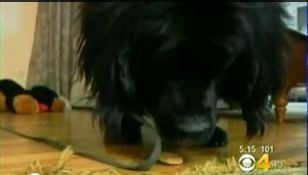

| Visitors Now: | |
| Total Visits: | |
| Total Stories: |

| Story Views | |
| Now: | |
| Last Hour: | |
| Last 24 Hours: | |
| Total: | |
The Smell Of Cancer: Artificial Nose Seeks To Duplicate Dog’s Feat Of Cancer Detection
National Jewish Health and Metabolomx are working to identify exactly what dogs smell in a cancer patient’s breath and how that information might be used to detect lung cancer.
“We know that early detection of lung cancer can greatly improve a patient’s chances of survival,” said James Jett, MD, Professor of Medicine at National Jewish Health. “The multitude of chemicals in a person’s breath may provide valuable insight into what is occurring inside a person’s body, and a noninvasive method to detect lung cancer before a person feels any symptoms.”
This dog can detect cancer by smell
Credit National Jewish Health/CBS
Lung cancer is the number one cause of cancer deaths in the United States, killing about 160,000 Americans every year; more than breast, colon and prostate cancer deaths combined.
Early detection of lung cancer dramatically improves a patient’s curative treatment options. Five-year survival for patients with advanced, stage IV disease is only 1 percent, while those whose cancer is detected early at stage I have a 70 to 80 percent of surviving five years and being cured.
Currently, five year-survival of all lung cancer in the United States is only 16 percent, because the disease is usually detected only after it becomes symptomatic and is at an advanced stage.
National Jewish Health is now enrolling participants in a trial to identify chemicals in exhaled breath that may be associated with lung cancer. Patients with lung cancer who have been diagnosed but not yet treated are eligible for the study. So are patients at high risk for developing lung cancer – older than 40, and a 10-pack-year history of smoking with a parent or sibling who has been diagnosed with lung cancer. Also eligible are those older than 40 with an indeterminate lung nodule of 3-20 millimeters, and those participating in other lung-cancer screening trials.
People interested in participating in this trial can call 303.398.1911.
Dr. Jett and his colleagues will use a machine developed by Metabolomx that has 128 sensors that detect volatile organic compounds in a person’s breath. They will seek to detect a cancer signature in the different levels of those chemicals. Participation in the trial will take about one hour for completion of a questionnaire and exhaled breath test. The actual breath test takes 5 minutes and is painless.
Contacts and sources:
William Allstetter
National Jewish Health
Clinical trial FAQ
Clinical trials at National Jewish Health
Read more at Nano Patents and Innovations
Source:



